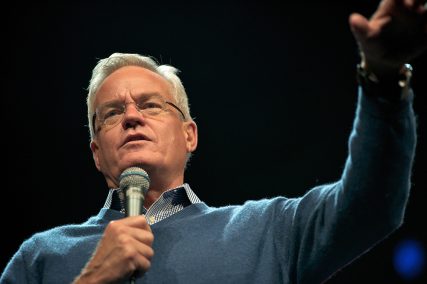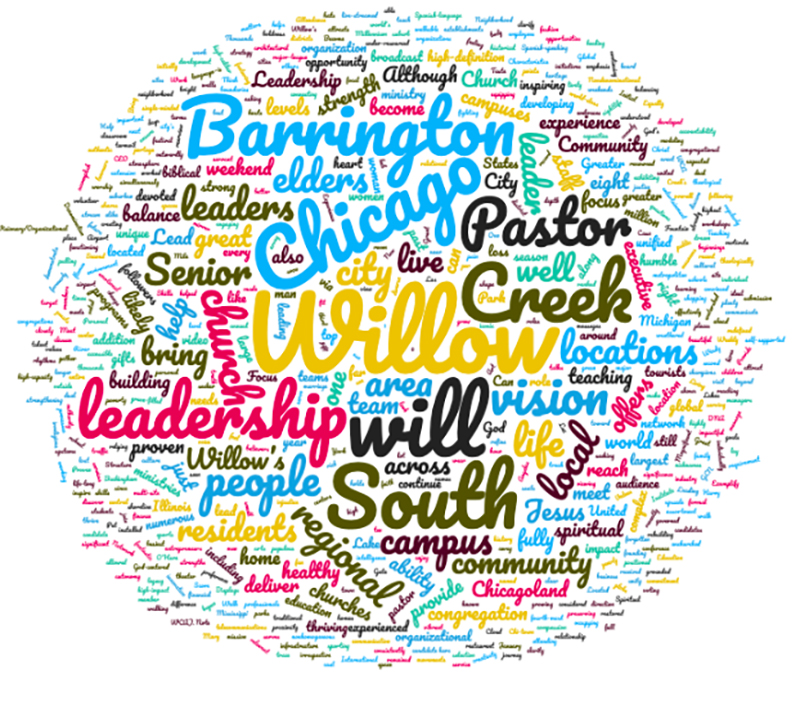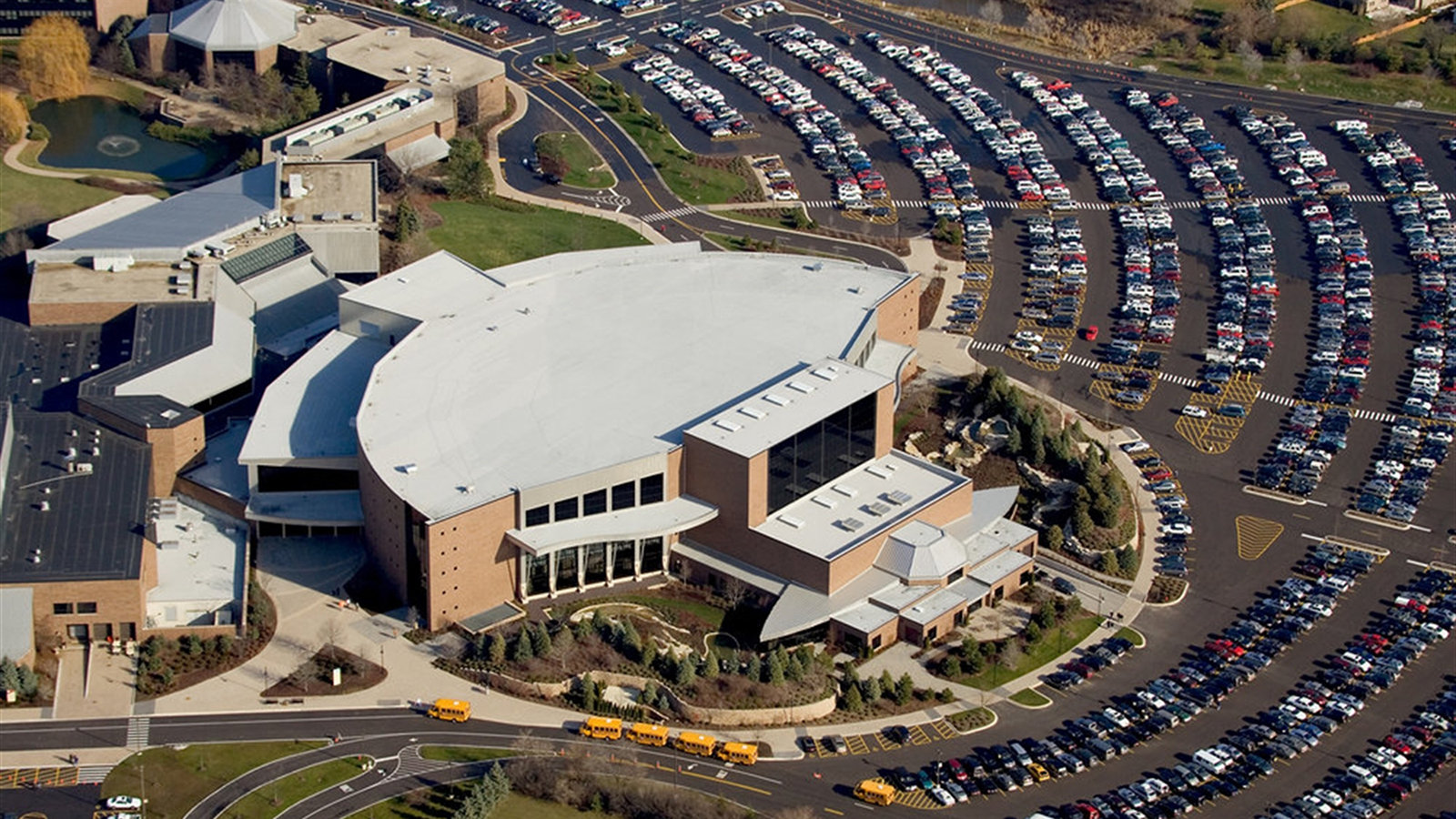
The main campus of Willow Creek Community Church in South Barrington, Ill. Photo courtesy of Global Leadership Summit
(RNS) — Willow Creek Community Church was probably the most influential evangelical church in the world, and its architect, Bill Hybels was the most influential evangelical pastor in the world. If they and he were a notch or two below those claims doesn’t matter much for this article. Not only was Hybels influential, he reshaped the job description, image and toolbox of what pastoring is understood to be.
As a result, every Christian needs to be concerned about Willow Creek’s model because that model has entered the space of every church. This influence has undoubtedly been diminished but the network they established remains.
Professors of pastoral theology (which I’m not) talk about the models of a pastor often, and I read some of their books. Historically, pastor models include priest (mediator between humans and God), preacher (Sunday morning 11 a.m. event), teacher (same event, different approach), prophet (Sunday, plus weekday calling out of social injustices and immorality), psychologist (both in counseling people in the church and in the substance and approach to preaching) and social activist (establishing justice, dismantling injustice and bringing that activism into the pulpit and church).

Bill Hybels in 2012. Photo by Marc Gilgen/Creative Commons
Bill Hybels, and the Willow Creek culture, formed into a different model: the leader of an organization. Organizations form their message into branding — and no church branded itself better than Willow Creek. Hybels packed the weekend service into a seeker-friendly service that spoke to the “unchurched Harry and Sally” about their common human concerns. What people didn’t like about churches is what Willow Creek avoided and what was relevant to human concerns was what they focused on. Which required, if one watched attentively over the last three decades, adjustments and accommodations to meet “unchurched Harry and Sally” wherever they were at the moment. Which led to the model of a pastor who reads the signs of the times, recognizes the felt needs and ministers to the average folks.
I have often defended Willow Creek’s ministries because I believe it has reached (and will continue to reach) many people for Christ. There are good people at Willow growing in Christ, supporting missions and their church, reading the Bible daily, praying their hearts out, loving their neighbors and filling their world with God’s grace.
Over time, I’m sad to say, Bill Hybels’ commitment to an organizational leadership model overcame his capacity to let Scripture shape what a pastor is. Someone sent me a link to the recently posted job description at Vanderbloemen for Hybels’ replacement. The job description outlines in great detail what Willow is looking for in their next senior pastor.
I read it carefully to comprehend how the description defined what a “pastor” is. To give myself a “word” impression, I pasted the whole thing into one of those word cloud apps. One cannot equate what emerges from a word cloud as infallible information, but neither should one ignore a word cloud’s graphic display.

Image courtesy of Scot McKnight
The most prominent term in the job description is “Willow.”
Self-advertisement is the heart of this job description’s word cloud: It displays a job description most concerned with “We are Willow Creek Community Church,” and we want someone who will expand our name, our reputation and our ministries. That word cloud says “our history is our future.”
From the days of the Apostle Paul, the first feature of any description of what a church is looking for is the list of qualifications for a bishop/elder/deacon in the Pastoral Epistles (1 Timothy 3:1-7 and Titus 1:7-9). On top of that, one must add that the design of God for all of us is to become Christlike (Romans 8:29). If that is God’s design, nurturing Christoformity is the heart of every bishop’s/elder’s/deacon’s calling.
This historic foundation in Scripture for those qualified for pastoring is ignored and absent in the Willow Creek job description. Furthermore, the historic expectation of a theological education is all but ignored. While the job description expresses preference for someone who is theologically grounded, that person does not have to have a theological education. While the latter is not absolutely necessary for the former, the latter has been the church’s wisdom for centuries and more.
Very rare is the self-educated person who can attain solid theological foundations. The historic focus on Spirit-shaped virtues – like godliness, holiness, spiritual formation, prayer life, Bible reading, etc – are meekly present in the job description but fall well below the focus on leadership and vision and the capacity to expand the brand.

The main campus of Willow Creek Community Church in South Barrington, Ill. Photo courtesy of Willow Creek Community Church
The absence of these features as the central terms, ideas and categories for a pastor’s qualifications reveals a culture at Willow that does not perceive these as important and therefore one that does not relate well to such terms. This can only happen because of a dismissal of the foundational importance of biblical teachings about bishop/elder qualifications and their importance in the entire history of the church.
Pastors are people who pastor people. In my recent book, “Pastor Paul,” I plumbed the pastoral theology of the Apostle Paul – who pastored folks in churches as well as pastoring other pastors, evangelists, elders, bishops and deacons. My central theme is that a pastor is someone who nurtures Christlikeness, or what I call “Christoformity.” That’s what a pastor’s focus is to be.
When we shift our central terms from pastors and priests and elders to leaders and entrepreneurs and managers, we leave the biblical images and reconfigure pastors with models designed for something else entirely.
Willow Creek’s job description is little more than a repetition of the reshaped pastoral role as defined by and embodied in Bill Hybels. A culture was formed during his years leading Willow — and it is clear to those of us who care about the colossal influence of Willow Creek that the DNA of Willow Creek has not changed since the resignation of Hybels.
Willow will get what it wants but what it wants is not what the Bible wants. You won’t find Willow’s favorite terms in any word cloud about Jesus’ pastoral life, or Peter’s pastoral life, or Paul’s pastoral life – or, truth be told – about the pastoral role throughout the history of the church.
To change a church culture like Willow’s —and those it has influenced — requires a conversion so penetrating that everything is born again. I am now working on a book about the kind of cultures our churches need most, ones marked not by success or size or expanding reach but by the spirituality of goodness. (More on that another time.)
I care about the church. I care about the American church’s major models. Therefore, I care about the impact of one of America’s most influential churches sending the message that a pastor is an entrepreneurial leader whose role is to expand the brand of a wealthy, suburban congregation.
(Scot McKnight is a professor at Northern Seminary and the author of several books, including “Pastor Paul: Nurturing a Culture of Christoformity in the Church.” The views expressed here do not necessarily reflect those of Religion News Service.)





